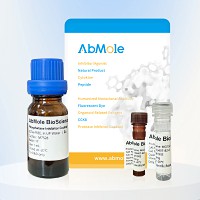All AbMole products are for research use only, cannot be used for human consumption.

Species: Human
Expression system: HEK 293
Purity: SDS-PAGE, > 95%
Endotoxin: protein < 0.2 EU/μg was determined by gel coagulation
Apparent molecular weight: 65~ 75kDa, reduced on SDS-PAGE
Storage and stability: After receiving, the product remains stable at temperatures below -70°C for up to 6 months. After recombination, the product should be stable at 4°C for 1 week or -20°C for 3 months. For long-term preservation, carrier protein (e.g. 0.1% BSA) is recommended. Avoid repeated freeze-thaw cycles.
Bioactivity: 5.0 μg/ mL (100 μ L/well) immobilized human IL-2 can bind to CD25/IL-2Rα, hFc and human IL-2Rα. Activation T cells, regulatory T cells (Tregs) and NK cells expressed CD25 at high levels, and the expression of high-affinity IL-2Rα was mainly confined to these cell populations. The il-2R α signaling pathway mediates a variety of biological processes in various cell populations, such as proliferation and differentiation of B cells and NK cells. A soluble form of IL-2Rα (IL-2Rα) is present in serum with increased expression on cells. The function of soluble IL-2Rα is unclear. Increased il-2R α levels in biological fluids have been reported to be associated with increased T and B cell activation and immune system activation. Serum il-2R α concentrations are elevated in many inflammatory processes and in some leukemias and lymphomas.
| Solubility (25°C) | It is recommended that this vial be briefly centrifuged prior to opening to bring the contents to the bottom. Reconstitute the lyophilized powder in ddH₂O or PBS up to 100 μg/ml. |
| Storage |
Powder -20°C 3 years ; 4°C 2 years In solvent -80°C 6 months ; -20°C 1 month |
| Related Cytokines and Growth Factors Products |
|---|
| Recombinant Human GDF-15 Protein (HEK293 N-hFc)
Growth-differentiation factor 15 (GDF15), also known as MIC-1, is a secreted member of the transforming growth factor (TGF)-β superfamily. GDF-15 has a role in regulating inflammatory and apoptotic pathways in injured tissues and during disease processes. GDF-15 overexpression arising from an expanded erythroid compartment contributes to iron overload in thalassemia syndromes by inhibiting hepcidin expression. |
| Recombinant Human FGFR1 Protein (HEK293, C-His)
FGFR1, also known as CD331, is a full-length representative protein consists of an extracellular region, composed of three immunoglobulin-like domains, a single hydrophobic membrane-spanning segment and a cytoplasmic tyrosine kinase domain. |
| Recombinant Human FGFR2 Protein (HEK293, C-His)
FGFR2, also known as CD332, acts as cell-surface receptor for fibroblast growth factors and plays an essential role in the regulation of cell proliferation, differentiation, migration and apoptosis, and in the regulation of embryonic development. FGFR2 plays an essential role in the regulation of osteoblast differentiation, proliferation and apoptosis, and is required for normal skeleton development. It also promotes cell proliferation in keratinocytes and imature osteoblasts, but promotes apoptosis in differentiated osteoblasts. |
| Recombinant Mouse BMP-4 Protein (E. coli, C-His)
Bone Morphogenetic Protein-4 (BMP-4) is a critical signaling molecule required for the early differentiation of the embryo and establishing of a dorsal-ventral axis. BMP-4 is secreted from the dorsal portion of the notochord, and it acts in concert with sonic hedgehog to establish a dorsal-ventral axis for the differentiation of later structures. |
| Recombinant Human Coagulation Factor X (HEK293, C-Fc)
Coagulation factor X, belongs to the peptidase S1 family. Coagulation factor X is initially synthesized in the liver. Coagulation factor X is a vitamin K-dependent glycoprotein that converts prothrombin to thrombin in the presence of factor Va, calcium and phospholipid during blood clotting. |
All AbMole products are for research use only, cannot be used for human consumption or veterinary use. We do not provide products or services to individuals. Please comply with the intended use and do not use AbMole products for any other purpose.


Products are for research use only. Not for human use. We do not sell to patients.
© Copyright 2010-2024 AbMole BioScience. All Rights Reserved.
